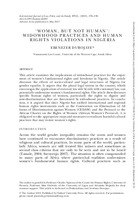| dc.contributor.author | Ebenezer, Durojaye | |
| dc.date.accessioned | 2019-10-04T12:34:39Z | |
| dc.date.available | 2019-10-04T12:34:39Z | |
| dc.date.issued | 2013-05 | |
| dc.identifier.citation | Durojaye, E. 2013. ‘Woman, but not Human’: Widowhood Practices and Human Rights Violations in Nigeria. International Journal of Law, Policy and the Family. 27(2), 176-196 | en_US |
| dc.identifier.uri | http://hdl.handle.net/10566/4912 | |
| dc.description.abstract | This article examines the implications of widowhood practices for the enjoyment of women’s fundamental rights and freedoms in Nigeria. The article discusses the effects of socio-cultural and legal structures of Nigeria for gender equality. It argues that the plural legal system in the country, which encourages the application of statutory law side by side with customary law, can potentially undermine women’s fundamental rights. The article then discusses specific human rights of women, particularly the rights to dignity and non-discrimination that are threatened by widowhood practices. In conclusion, it is argued that since Nigeria has ratified international and regional human rights instruments such as the Convention on Elimination of All forms of Discrimination against Women (CEDAW) and the Protocol to the African Charter on the Rights of Women (African Women’s Protocol), it is obligated to take appropriate steps and measures to eradicate harmful cultural practices that may violate women’s rights. | en_US |
| dc.language.iso | en | en_US |
| dc.publisher | International Journal of Law, Policy and the Family | en_US |
| dc.subject | Human rights | en_US |
| dc.subject | Widowhood practices | en_US |
| dc.subject | Nigeria | en_US |
| dc.subject | Gender equality | en_US |
| dc.subject | Customary law | en_US |
| dc.title | ‘Woman, but not Human’: Widowhood Practices and Human Rights Violations in Nigeria | en_US |
| dc.type | Article | en_US |

